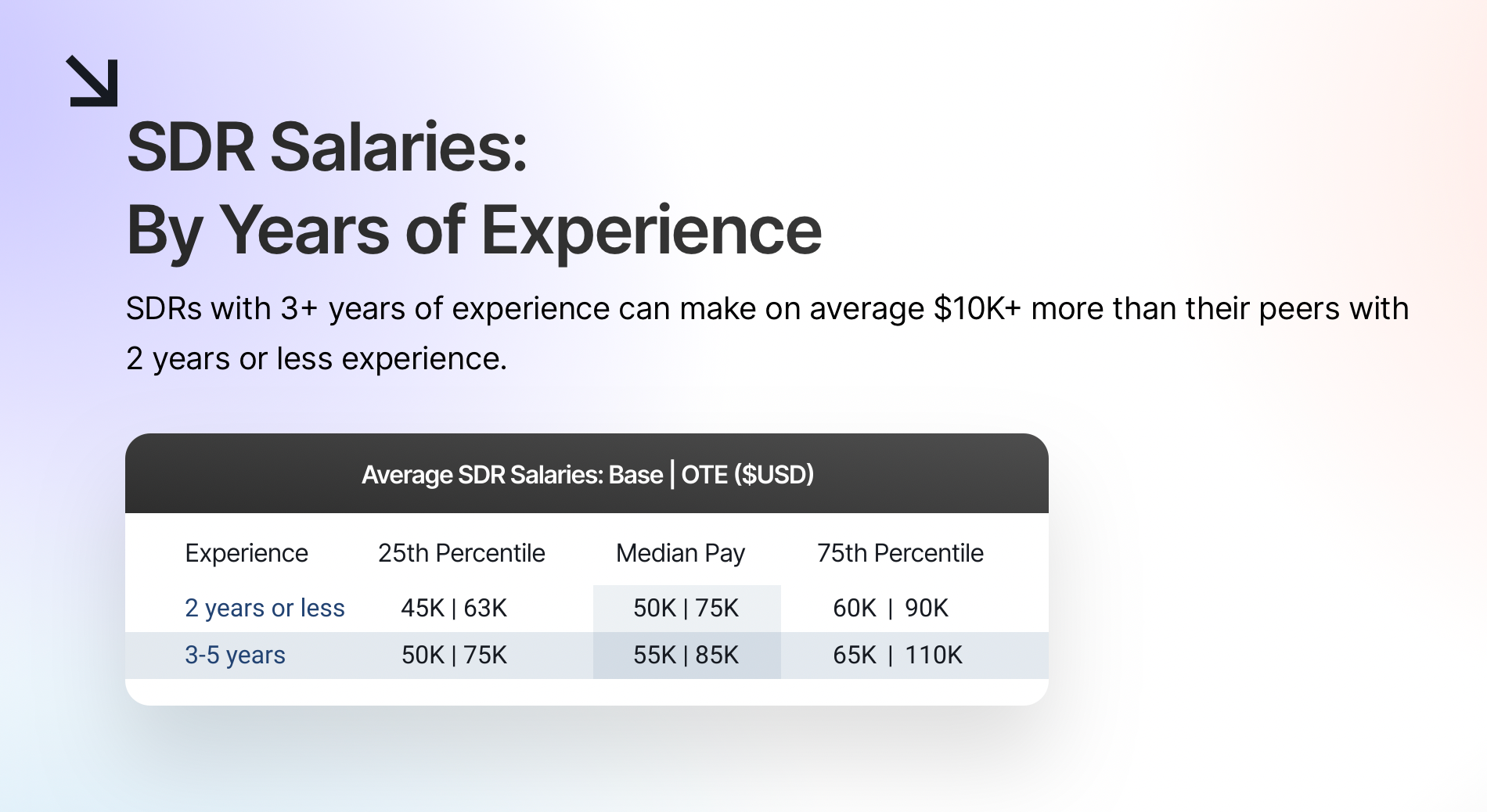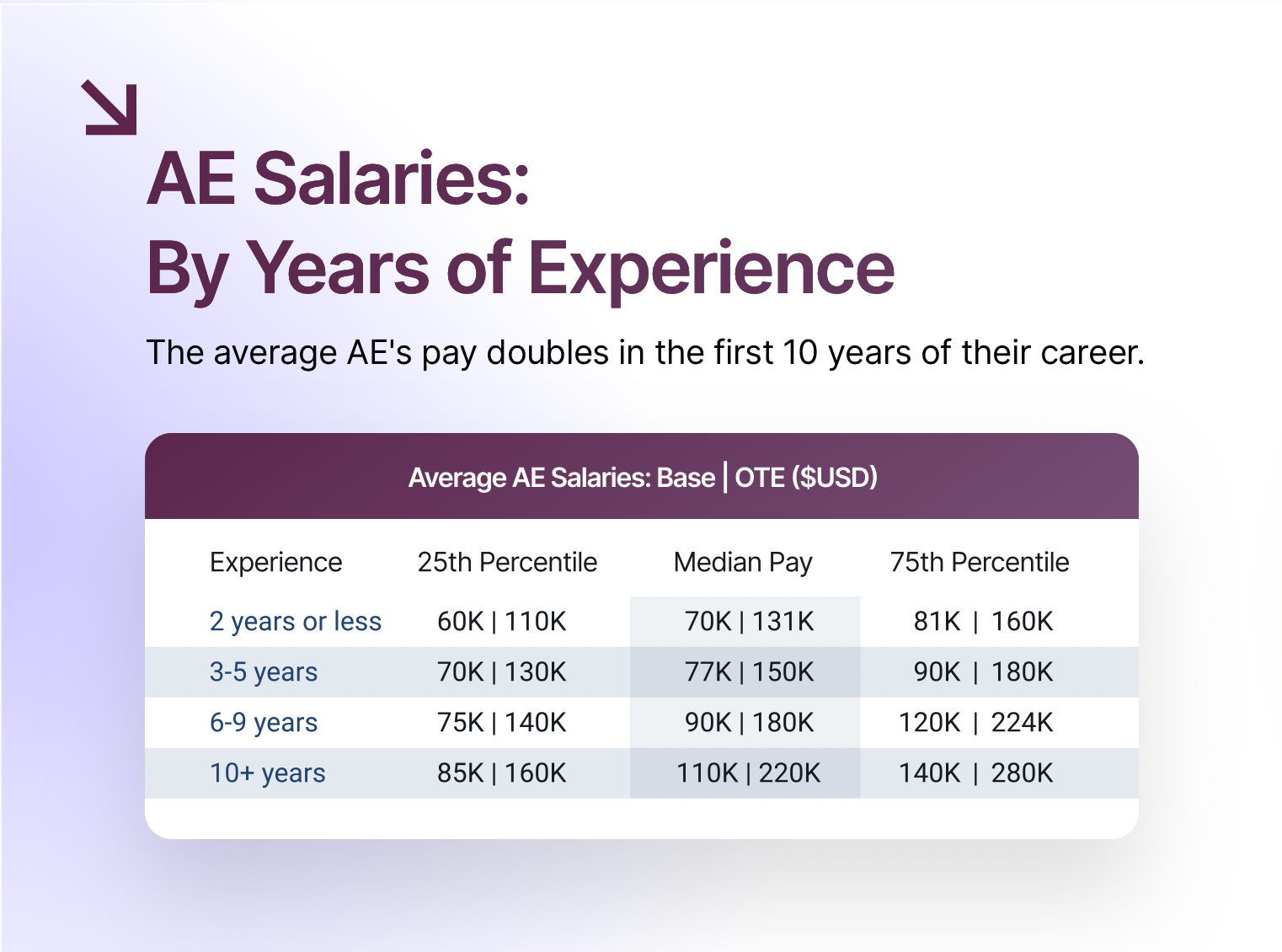Not to mention – how to break into it.
With over 13 million salespeople estimated to be working in America, sales is one of the largest industries in the country, but no segment of sales has been growing faster than tech sales.
Tech sales is also one of the most lucrative sub-industries within sales. Sellers at the highest level regularly clear $250k, and some even clear $500k. For this reason, as the labor market has heated up, many people are looking to transition into tech sales, but tech sales isn’t for everyone.
In this blog, we’ll give you a top down overview of the basics:
- What tech sales is
- Tech sales career paths
- How much different tech sales roles pay
- Pros and cons of a tech sales career
- How to break into tech sales
What Is Tech Sales

A quick definition of tech sales is any sales role involving the sales of new technology. That said, tech sales as it has commonly come to be known is not, (in most cases) calling people over the phone and selling them computers or iphones.
Instead, tech sales has come to encapsulate the salespeople that work for primarily B2B (business-to-business) companies selling, for the most part, SAAS (software-as-a-service) technology.
The modern economy has largely become underpinned by this technology. Though it may not come to mind first when you think of tech, nearly every sector of the economy is touched by cloud services, payment platforms, productivity software, and other SAAS tech.
That’s where tech sales comes in. As a tech salesperson, you’d be one of the salespeople pitching companies on new services that can increase their bottom line, giving you a rare route into the most lucrative industry in the world without necessarily needing a programming degree.
What Do Tech Salespeople Do
Tech sales falls under the umbrella of what we’ll refer to as modern sales. This isn’t Glengarry Glen Ross. You aren’t calling individual people on the phone and trying to convince them to buy something they don’t need like luxury kitchen knives.
Due to the technical nature of the industry, a tech salesperson is instead expected to build a pipeline of companies which their product could add value for, inform relevant individuals the companies of their products’ capabilities, and steer them to buy.
This means having a deep understanding of your company’s products. It’s this technical knowledge, as well of the scale of the revenue, that makes tech sales such a sought after and highly paid skill set.
Tech Sales Career Paths
Sales Development Representative / Business Development Representative
A sales development representative or business development representative is the near-universal entry-level role of tech sales. An SDR or BDR is responsible for qualifying inbound leads, or determining whether interested parties are able to buy, as well as finding outbound leads, or cold calling/emailing.
As an SDR or BDR, you’ll be a player on a sales team responsible for setting meetings with prospects that are ready and able to buy, so that your account executive can close the deal and notch a win.
Account Executive
An account executive is a proven seller who is ultimately responsible for the closing of deals. An AE helps customers once they are well-along in the buying process, providing them with information and product demos, and negotiating a price to take the customer across the finish line.
This job appeals to salespeople that enjoy the thrill of the sale, and pays highly due to its rigorous and competitive nature.
Account Manager / Customer Success Manager
An account manager or customer success manager is one part salesperson, one part customer service rep. An AM or CSM is responsible for customers who have already purchased an SAAS software, and assists the customer in using it to ensure they renew their software rather than buy software.
Although it occasionally involves upsells, this is a job that rewards salespeople with soft skills and a desire to help. It is also generally less stressful than an account executive job, as your job performance is only dependent on helping existing customers have a satisfactory experience rather than tracking down and convincing strangers to buy something they don’t understand.
How Much Does Tech Sales Pay
With the particulars of the industry and the job taken care of, we’ll get to the fun part. Tech sales is a profoundly lucrative industry – it pays a lot.
An SDR working at their first tech sales job job may hit six figures if they hit quota. Not only that, but the payscale as you rise higher up the ranks grows exponentially.
In an Account executive role, you may make $250k, and while not the norm, it’s not unheard of for VPs of sales to clear over a million a year.
Ultimately, how much you’re compensated in a sales role depends on several factors: Your history of hitting quota, your job title, obviously, your technical knowledge and expertise, as well as the scale of the business that you’re bringing in.
Tech sales jobs are a booming sector of the economy, and despite recent tech industry headwinds, companies are still seeking out tech sales professionals at a brisk clip. From 2021-2022, sales pay skyrocketed nearly 40%. It’s still a tight labor market, and that’s great news for aspiring sellers.
Tech Sales Salary By Role

Tech sales’ exorbitant pay is a poorly kept secret, but employers still try their best. Luckily, Bravado has a network of over 200,000 sellers to pull data from, and with our recent partnership with CompGauge, we’ve assembled a massive dataset of sales salaries.
You can find more in our comprehensive 2022 compensation guide, but we’ll paraphrase the key takeaways.
SDR/BDR
As a sales development rep or business development rep, you’re lowest on the totem pole and will be compensated accordingly, but the job can still pay quite well. Expect to make 60k to 110k depending on factors such as experience, skill, and most of all, whether you can hit quota.

Account Executive
As an account executive, you’re officially in the big leagues. Due to the importance of the role, account executive is a job with extraordinarily wide pay latitude. A low performing account executive at a small company may only clear $90k, while a high performing account executive at a major tech company could clear over $400k! Expect in an average role to clear roughly 180k-220k if you regularly hit quota.

Customer Success Manager
A customer success manager will be better compensated than an SDR, although not quite to the stratospheric levels an AE might. Expect to be compensated roughly $150k if you hit quota.
How Can I Transition Into Tech Sales
Of course, there's always a catch: Breaking into tech sales is hard. As a challenging job with tremendous earning power in a hot industry, it is both a career that many want to do and few can handle. That means breaking in means beating a lot of other people who want to do the same thing.
The upside of this is that sales skills aren't like biology or music skills. You don't need to go to school for them. The same things that make a great seller, such as grit, charm and persuasiveness make a great sales job applicant. So ultimately, breaking into tech sales is a meritocratic process, just like selling. It might take 99 nos, but you only need one yes.
Some companies, like Oracle, have feeder jobs programs. These are profoundly difficult to get into, but provide an excellent education in tech sales. Other sellers break in by paying their dues in other sales roles. Some break in on pure luck.
There are also feeder courses for tech sales such as Tech Sales U from Bravado (sorry, a plug), which provides career advice, sales coaching, and introductions to major tech companies for zero dollars.
There are a lot of ways in, but we've got a little advice on breaking into tech sales that applies to all of them.
Sales Skills Are a Must
Getting into tech sales is going to be essentially impossible if you can't sell. And even if you did break in, what would you do when it came time to actually sell? So honing your persuasiveness, and demonstrating it at every turn, is a must. Send a thank you note after your interview. Have an answer ready for anything. Tell stories that directly sell you as a candidate rather than indirectly.
Tech sales takes salesmanship, so most people that succeed at breaking into tech sales do so by paying their dues in a less lucrative line of sales. But if you can show you're undeniable, tenacious, persuasive, and effective, a good hiring manager won't care. They'll hire you over an unsuccessful-but-experienced seller 10 times out of 10.
Do Your Research
In a line of work like tech sales, preparation is everything. Just like cold calling takes research to tailor your pitch, applying and interviewing for tech sales jobs takes effective, prepared outreach to sell yourself as right for a particular company rather than any company.
This also will generally mean researching their product, which can take serious mental effort. But if you can't understand what a company's product does, odds are, you're never going to be able to sell it. And there just isn't much purpose in a sales career if you never get to cash an OTE check.
Treat It Like Prospecting
Think of trying to break into tech sales like prospecting for a sale. You don't have time to apply for every tech sales job on earth, so be deliberate. Pick the jobs that seem most accessible, and for which you are the best fit. Reach out with a personalized greeting, and, be it through a cover letter, a reference, or a direct ask, show them that you are perfect for the role.
It might take time. It will probably take a lot of effort. But these small demonstrations of salesmanship can pay off in a big way a few years into your career.
Pros And Cons Of A Tech Sales Career
On its face, tech sales is a profoundly appealing career path: You make tech money without needing a college degree. That said, it isn’t a career for everyone.
For one, tech sales is hard. This isn’t a cushy job, and it pays well because it’s difficult, both in time commitment and in skill. The looming specter of quota means you may be pulling weeks well over 40 hours when it’s crunch time. But if you can handle the high pressure, you’ll find yourself in an industry built on camaraderie where you can earn more than some programmers could dream of.
Here are some other pros and cons to consider before trying to break into tech sales:
PROS:
- high pay
- remote work opportunities
- upward mobility
- exciting and dynamic career
CONS:
- Unpredictable income
- Can be fired for missing quota
- Sellers often face rudeness or abuse from prospects.
- Still requires high technical skill and study.
But if you've decided you're ready to take the leap and break into tech sales, then it's time to do some prospecting and build that sales network.





